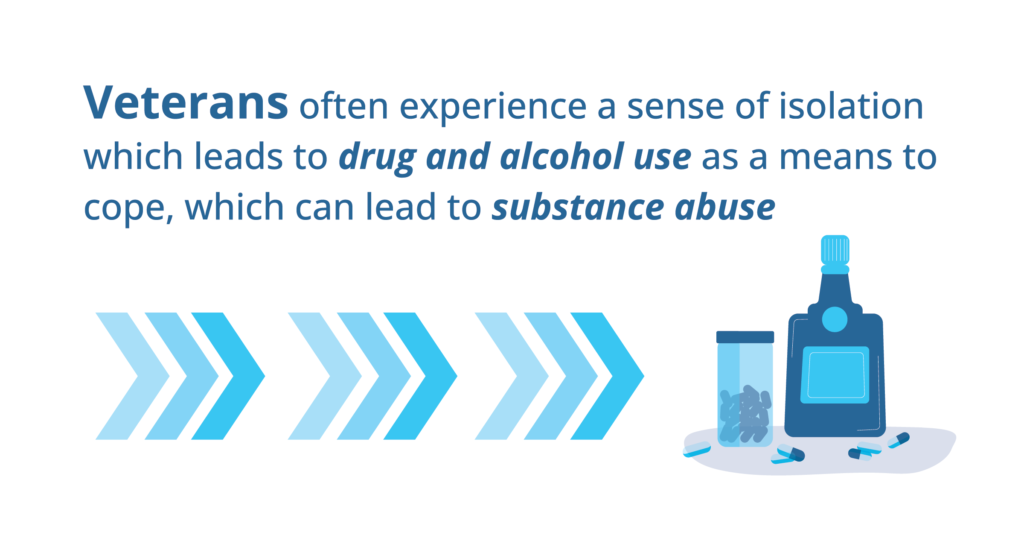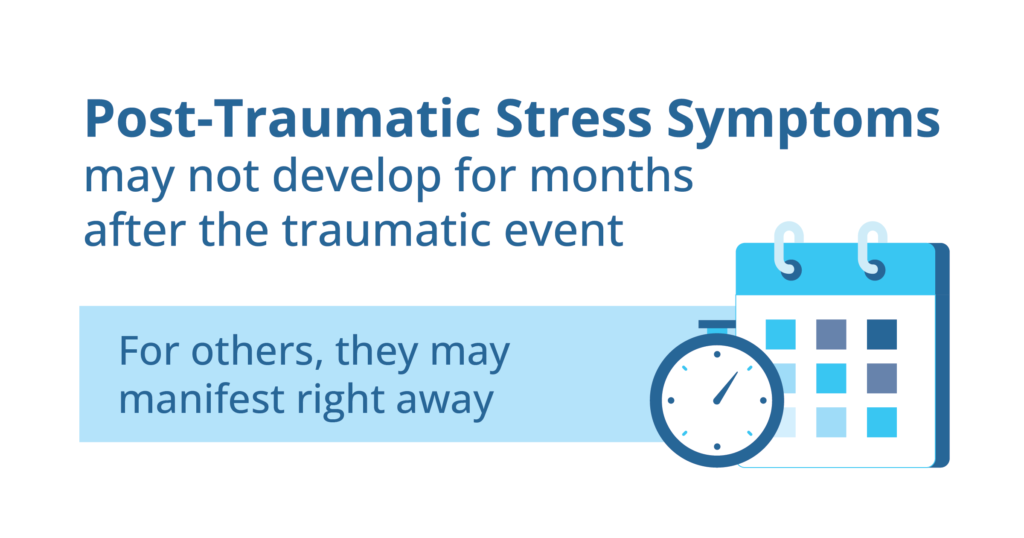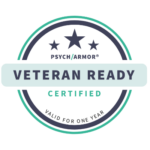PTSD in veterans can occur when you experience a real or perceived life-threatening event. Stress responses are natural after this kind of event and serve to keep you aware of any continued threat that could harm you. These traumatic-stress responses can show up differently among individuals. For some, the symptoms of post-traumatic stress may manifest right away and then gradually reduce over time. For others, traumatic stress symptoms may not develop for months after the traumatic event. If the symptoms of traumatic stress have been present for several months without resolve, and if the symptoms are causing problems in your life, you may have post-traumatic stress disorder (PTSD).
As a military service member, you’ve dedicated yourself to providing protection and safety to your country. Although providing service can be incredibly meaningful, in the course of your service, you may have come face to face with some of the darkest aspects of the human experience. The threats you’ve faced may have changed the way your nervous system perceives safety. PTSD is a survival response, and although the experience can be frightening, painful, and feel out of control, there is healing, hope, and support available.
Paul’s PTSD & Recovery
Paul is a veteran who served his country for 35 years. He did several tours in the Vietnam War and continued to serve in the military once he returned home. Paul was grateful and eager to defend his country and considered it an honor to put his life on the line for causes he believed in. In his training, there was discussion about some of the psychological impacts that a war could have on its soldiers, and Paul knew the risks. He was willing to face whatever came his way.
Not long after the war, Paul returned home. It was several months before he began to exhibit symptoms of PTSD. However, Paul didn’t realize that what he was experiencing was PTSD. When he did consider this to be a possibility, he felt ashamed and initially kept it to himself.

How Symptoms of PTSD Can Manifest
The Diagnostic and Statistical Manual diagnoses PTSD through eight Criteria. There are many ways these symptoms can manifest. This article follows Paul’s experience with each of the criteria below.
Criterion A (one required):
A person has been exposed to actual or threatened death, injury, or sexual violence. This can occur in the following ways:
• Directly
• Witnessing this happen to another
• Learning that a loved one has experienced these events
• Indirectly experiencing the traumatic events, such as in a professional setting (for example, a healthcare worker, first responder, counselor, etc.)
Paul experienced all of these exposures. While in combat, Paul faced the end of his own life multiple times. He witnessed the death of fellow soldiers. Paul also witnessed sexual violence that occurred related to combat. Once Paul returned from the war, he interacted with other veterans who would talk or joke about some of their experiences in combat. Paul would make jokes about the war as well, but doing so often led to flashbacks or nightmares after these conversations.
Criterion B (one required):
A person re-experiences the traumatic event through:
• Flashbacks of the event
• Memories that arise spontaneously and will not go away
• Nightmares
• Emotional distress after remembering the trauma
• Physical responses (such as increased heart rate, sweating, etc.) upon remembering the trauma
Upon his return, Paul felt grateful to be home and he focused on advancing his military career. Paul thought he was adjusting well, but he did find that he was diving full force into his work. Paul took every opportunity for overtime he could take. When he had time off, he busied himself with volunteer tasks in his local community. While volunteering, Paul met a woman named Cynthia who later became his wife.
However, about 6 months after his return, Paul began to have nightmares of combat. The days following his nightmares were dreary. On these days, Paul would feel irritable and be shorted tempered with Cynthia. Although Paul functioned well in work, he would have intrusive memories arise at random. Paul did what he could to push these memories away and refocus on his work. However, he found himself fatigued, sweating, and having difficulty with concentration once a memory arose. To cope, he increased his quantity of work as a means of distraction. At a relatively young age, Paul was diagnosed with high blood pressure.
Criterion C (one required):
A person will avoid reminders of the trauma through:
• Avoiding thoughts or feelings related to the trauma
• Avoiding reminders of the trauma, such as people, places, or events
Paul initially didn’t think he was avoiding his combat-related trauma because he continued to work in the military. Paul prided himself on being able to support combat strategy in his work. However, when anyone would mention the emotional or psychological impact of soldiers, Paul found himself becoming aggressive, dismissive, and he would leave the rooms when these conversations occurred.
Criterion D (two required):
Negative thoughts and feelings began at the onset of the trauma, or have become more intense after the trauma. These thoughts and feelings include:
• Trouble remembering aspects of the trauma
• Perceiving oneself and the world in an adverse way
• An overdeveloped sense of blame toward one’s self or others for causing the traumatic situation
• An overall negative or discouraged mood
• Decreased interest in things that used to bring joy
• Feeling alone
• Trouble feeling positive moods
Over time, as Paul continued adjusting to life outside of a warzone, he began to feel exhausted. Paul knew he was overworking, but when he wasn’t working, he felt extreme anxiety and irritability. When Cynthia encouraged Paul to connect with the hobbies he enjoyed before the war, Paul would feel angry and state that he was not the same person he was before.
Paul found it challenging to feel interested in anything outside of work, and he didn’t particularly like socializing. He was aware that when he’s socialized, he found himself sharing his views about how awful the world is. He noticed that others didn’t quite seem to know how to react to his pessimism, which led him to feel even more alone. Paul became highly critical toward other groups of people and blamed them for the causes of war and world problems. This negative view toward others led people to avoid interacting with Paul.
Criterion E (two required):
After having experienced the trauma, a person’s nervous system will be hyperactive. A person may respond in the following ways:
• Acting aggressively or with irritability
• Engaging in high risks behaviors
• Hypervigilant
• Have a heightened startle reaction
• Have difficulty with concentration
• Have trouble sleeping
Paul was generally known for being stern, rigid, and grumpy. People at his work found Paul to be intimidating because he was a large and powerful man. His staff would tiptoe around him because his hypervigilance and heightened startle response put people on edge. Paul felt embarrassed by his hypervigilance at times but then would defend it to hide his embarrassment from others.
Over time, Paul’s nightmares continued. They would only reduce in frequency when he took over-the-counter sleeping medication or drank alcohol before bed. Paul noticed himself developing a tolerance, needing more and more sedatives or depressants to relax. When Cynthia shared her concerns that Paul had PTSD or her concerns about him developing an addiction, Paul felt annoyed by Cynthia’s suggestions. From Paul’s perspective, he was doing what needed to be done. He knew he was anxious and angry all the time, but he just figured this was the way things were.
Criterion F (required):
Symptoms have lasted for more than one month.
Criterion G (required):
Symptoms cause problems and challenges in a person’s life, occupationally, socially, personally, or both.
Criterion H (required):
Symptoms are not due to other factors such as illness, medication, or substance abuse.
Paul’s symptoms of PTSD continued for several years after combat. He denied these symptoms for years. Although Paul was able to disguise some of his PTSD symptoms as toughness and grit within his work environment, several officers shared with him that they noticed how on edge he was. His work performance started to reduce in quality as he was told that although he gets the job done, he is difficult for others to be around. This problem became significant enough that it risked his position.
Paul’s wife Cynthia also shared with Paul that she felt lonely in their relationship. She shared that she could not connect to Paul because he was so busy, angry, and on edge. Cynthia aimed to be a support but felt powerless to make any change because Paul refused to talk about his experiences. It wasn’t until Cynthia shared that she was considering divorce that Paul realized he needed to seek support.
Once Paul realized that he risked losing his career and his marriage as a result of his PTSD symptoms, he decided to seek support. He reached out to his local veteran’s center and decided to attend a treatment program specifically focused on PTSD recovery. Paul shared that his life radically changed after treatment. He shared, “I felt as though I awoke from a long sleep.” Even though Paul still had nightmares from time to time, they reduced in frequency and he developed tools to help him cope with the physiological arousal after the nightmare. Paul now provides volunteer support for other veterans to help them realize the signs of PTSD. He shared his story as a way to provide hope that a better life is possible.

PTSD Support for Veterans
Veterans experience challenges when they return to civilian life after time in combat. Family members try to support veterans in well-meaning ways; however, to the veteran, it may feel as only those who have been in combat can understand their experience. The sense of isolation can lead to drug and alcohol use as a means to cope, which can lead to substance abuse.
Risk factors that may predispose veterans to develop PTSD include previous exposure to traumatic events, adverse childhood experiences, being marginalized in society (for example there are higher rates of PTSD among women and minorities), having low levels of education, being a service member (instead of an officer), having long deployment lengths, and being in the army.
There are many mental health services available for military veterans. For resources, you can explore:
• Residential treatment that specifically treats PTSD
• Alcoholics Anonymous & other 12-step programs groups focused on veterans
If you believe that you or a loved one would benefit from PTSD recovery, contact The Haven Detox today to speak with a treatment specialist.






